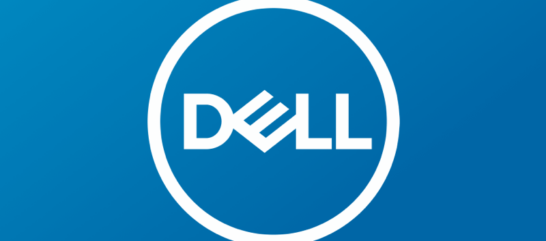Marketing to businesses online doesn’t have to be boring, and we thought it would be helpful to share some of the best B2B social media examples from companies that truly understand that.
Marketers across the board have embraced using social media for their campaigns because it is an effective marketing strategy to build brand awareness and strengthen social selling.
For example, 75% of B2B buyers use social media to make purchasing decisions. So brands need to prioritize the social platforms that will inform, inspire, and reach their customers the best.
The companies listed below stand out from their competitors by using innovative design strategies, fully understanding what their target audiences want and need from content, developing creative and unique ways to reach more people, and building communities around their brands.
If you’re in need of some inspiration for your B2B marketing plan, keep reading!
Best B2B Social Media Examples
1. IBM
IBM uses social media in a compelling way to showcase its history and legacy in the technology industry.
By sharing photos and videos on Instagram of past products from the last hundred years, it builds trust and credibility with current and potential customers. Making it clear that IBM is a company that has seen repeated success for a long time.
IBM also shares videos of employees sharing about their employee experience, explaining complex concepts like quantum computing, and what new technologies they are researching.
This kind of storytelling reinforces the brand’s company values around innovation, trust, and personal responsibility.
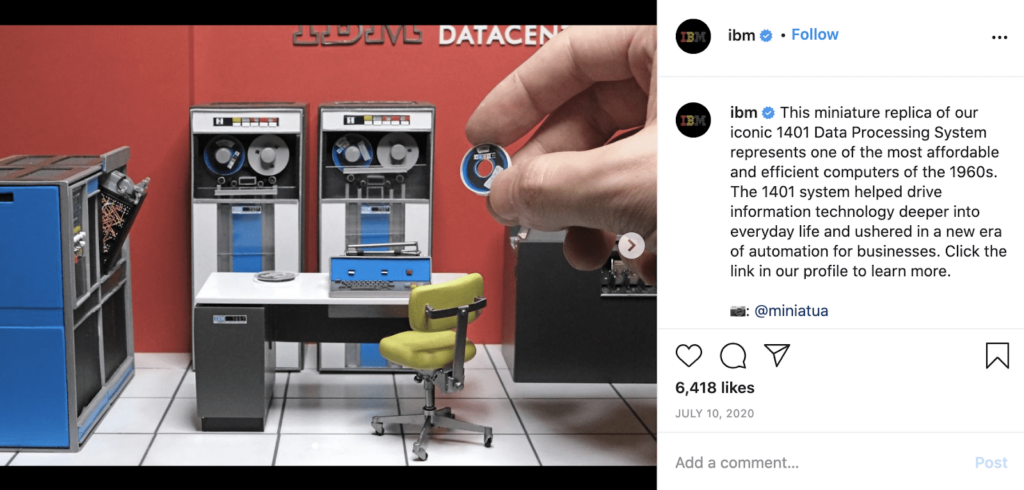
2. Mailchimp
Marketing automation company Mailchimp serves as a top example for how to use design creatively to stand out from the competition.
Many of Mailchimp’s posts use colorful and interactive graphics to excite viewers and encourage engagement.
On LinkedIn and Instagram, Mailchimp shares profiles and tips from their partner community. These customer profiles from users across the globe show off the wide range of use cases Mailchimp supports.
During COVID-19, Mailchimp used Instagram to highlight how its employees were working remotely and staying connected behind the scenes. This worked to strengthen the employer brand at the same time providing value to small businesses with ideas for virtual and remote employee engagement.
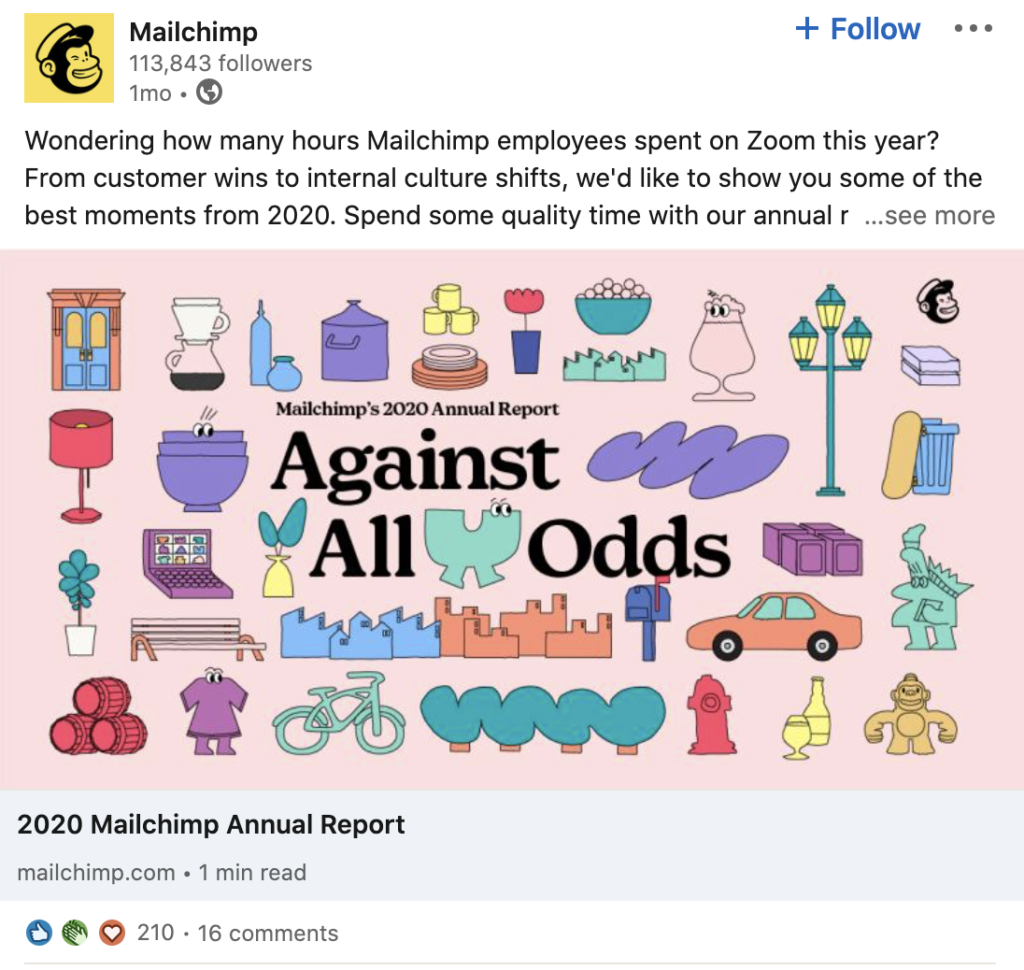
3. Hubspot
For an example of a B2B brand that provides customer value on social media through content, look no further than Hubspot.
Hubspot consistently posts training, resources, and research so that they have become a valuable source for thought leadership and insights on trends.
The strategy focuses more on knowledge sharing to help marketing and sales professionals with their jobs and less about pitching their own products.
What Hubspot does especially well is engaging with commenters and striking conversations with open-ended questions that lead to a sense of community.
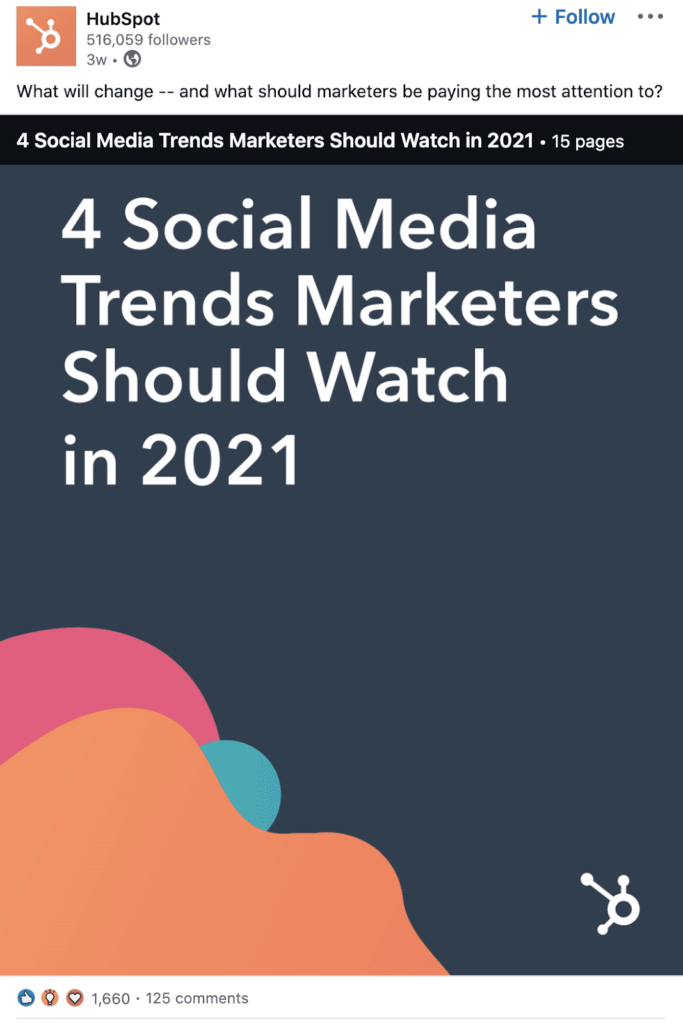
4. Shopify
Popular e-commerce platform Shopify built a massive following on YouTube and has had a lot of success with its video marketing strategy. Why? Because they know what their target audience needs.
They produce highly viewed How To videos and tutorials for aspiring entrepreneurs and owners of digital businesses. They know their target audience for their solutions and cater videos to them with checklists and templates for growing skills.
Shopify also shares success stories of customers that started their own businesses to inspire others that are on the fence about launching a startup. This positions Shopify as a valuable resource for the very customers that benefit most from using their platform.
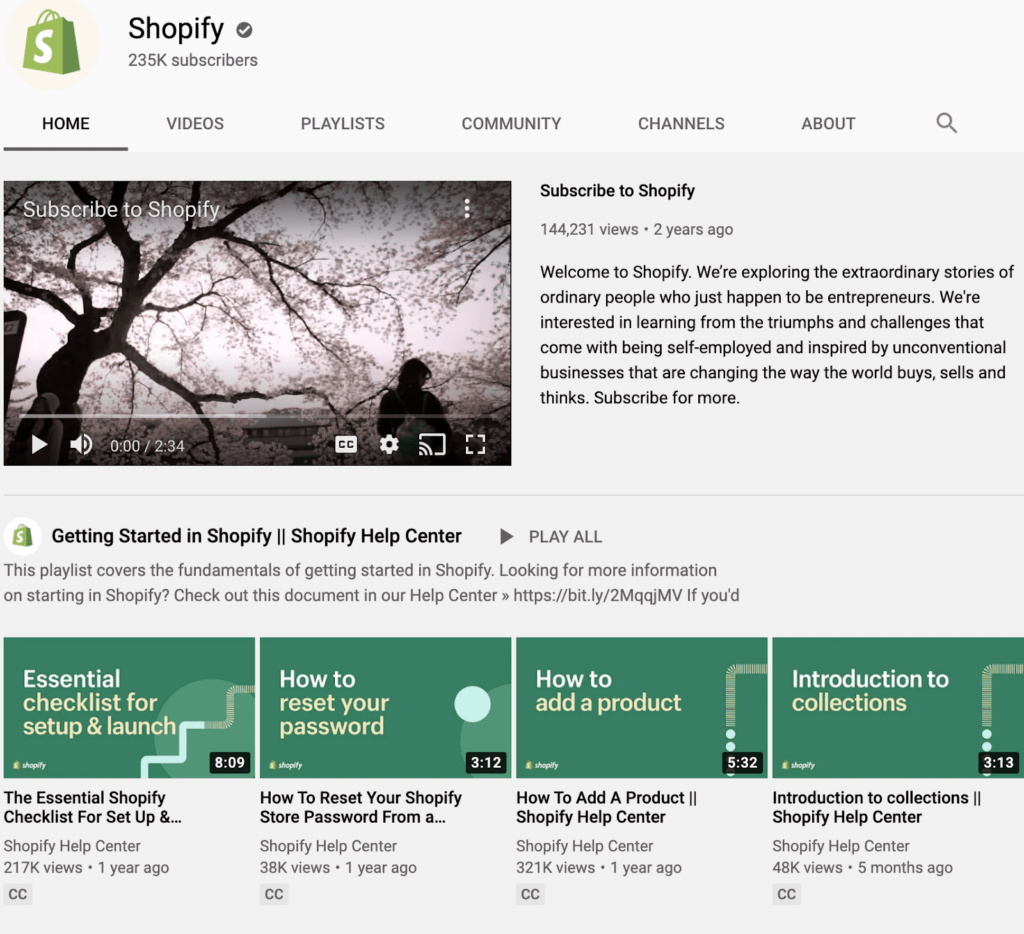
5. Zoom
Zoom saw major growth in users and usage at the start of COVID-19 and social distancing restrictions. With so many new people on the platform, Zoom doubled down on providing tips and training through its social media networks.
Helping people become more comfortable with new products and services is a powerful way to use social media and show customers that you have their back.
It’s also a great strategy to highlight new product features and enhancements. Zoom does a great job by speaking directly to their users and showing potential customers how much they value client support and continuous improvement.
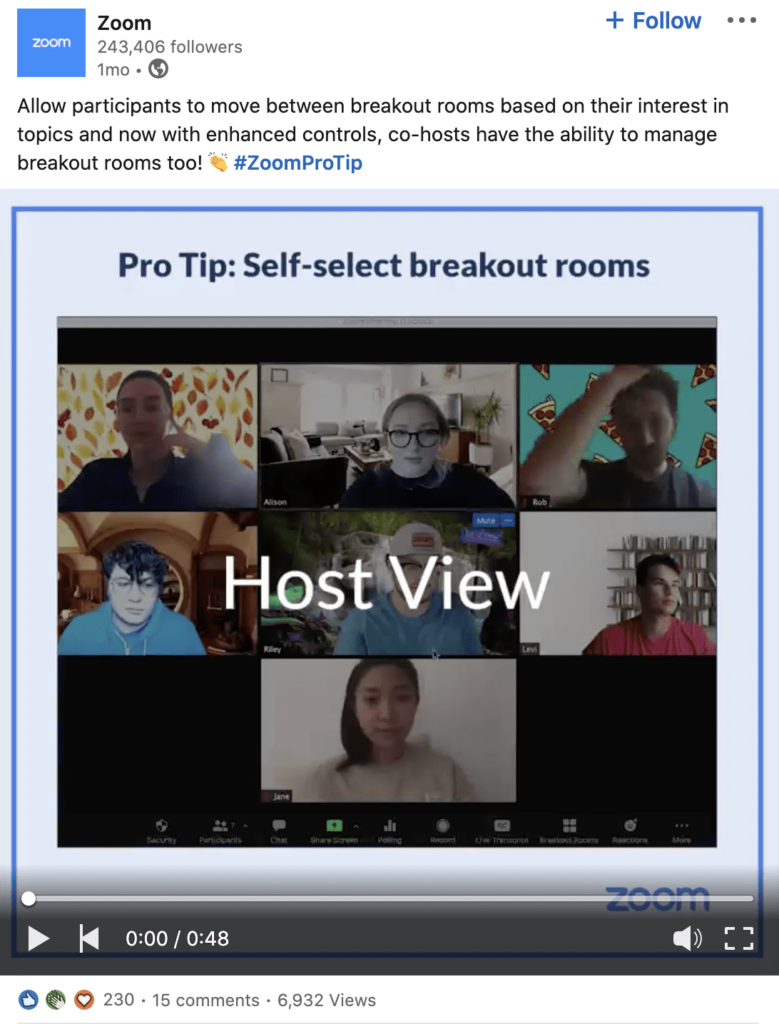
6. Dropbox
Dropbox, the digital content sharing and hosting platform, uses its brand channel on LinkedIn to not only share product and company announcements, but also to highlight employees.
Employees at Dropbox use the hashtag #LifeInsideDropbox and the brand account frequently reposts and shares employee stories and content.
This drives more authentic stories about the employee experience working at the company and takes a more personalized and human approach to learning about a company’s employer brand.
Potential B2B buyers can see the enthusiasm around the brand from its own employees and make it more likely to want to do business with them.
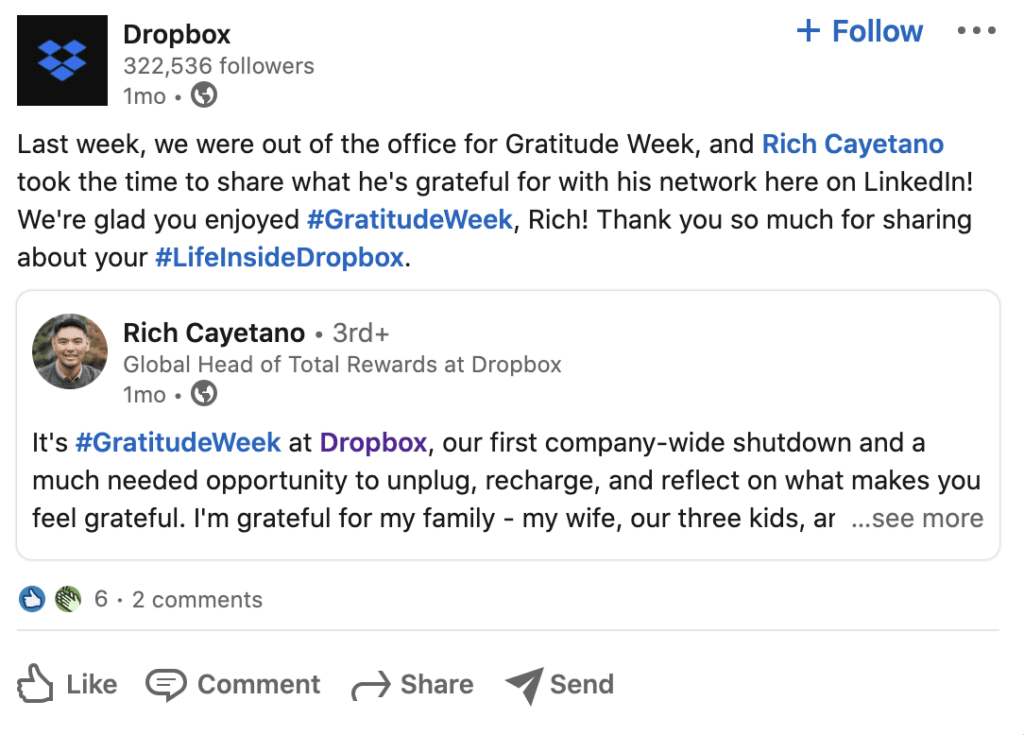
7. Cloudera
Cloudera is a leader in the cloud software industry and has proved to be just as innovative in its social media marketing efforts.
The company uses the LinkedIn Live feature to stream live conversations around how they are working with data.
Livestreaming on LinkedIn is a great tool to build awareness to your brand channel and boost visibility on the platform.
Cloudera also uses EveryoneSocial to power their employee advocacy program. Cloudera employees use the platform to create and engage with content from the company and easily share it with their social networks.
Companies that empower their teams to be employee advocates increase their reach and engagement on social networks, helping sales and marketing teams build customer relationships.

8. Adobe
Adobe has a vast network of content creators that use their digital creative solutions. So Adobe leverages the power of user-generated content to fill its Instagram feeds with inspiring content edited and designed with their tools.
Sharing user-generated content is both cost effective and important for building customer loyalty. It is an especially impactful social media strategy as it recognizes and promotes individuals as customer testimonials.
Adobe also engages its employees to share about the company on social media by using EveryoneSocial’s employee advocacy platform. They were able to expand the reach of their social campaigns and increase engagement.
You’ll see on LinkedIn that Adobe posts more employee stories and highlights the benefits available to their workforce. This is a powerful way to attract top talent that shares their values and strengthen their employer brand.
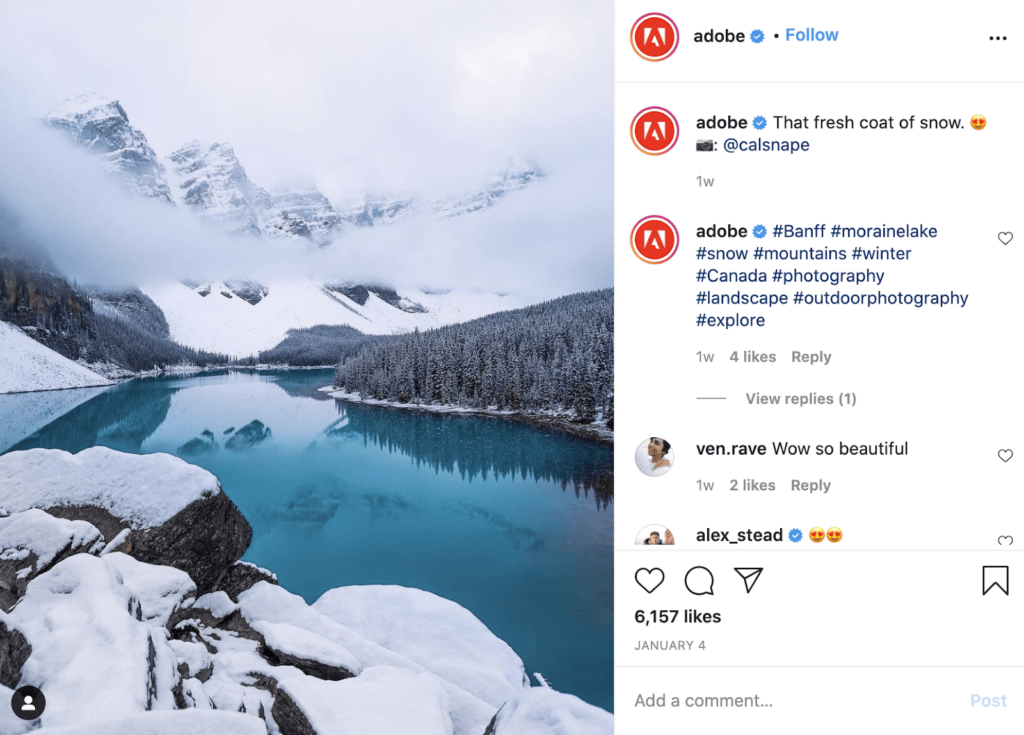
9. Micro Focus
Micro Focus is one of the largest enterprise software companies. And the brand does a great job of using social media to connect their products and services to the real people that benefit from them.
By using emotion in their posts and showing customer stories from industries that you might not expect, Micro Focus stands out from other software providers with more personalized and genuine storytelling.
Focusing on time saved and even mental health benefits from using their services addresses the bigger pain points that their buyers may experience.
Micro Focus establishes a caring presence on social media that builds trust and credibility with both new and existing customers.
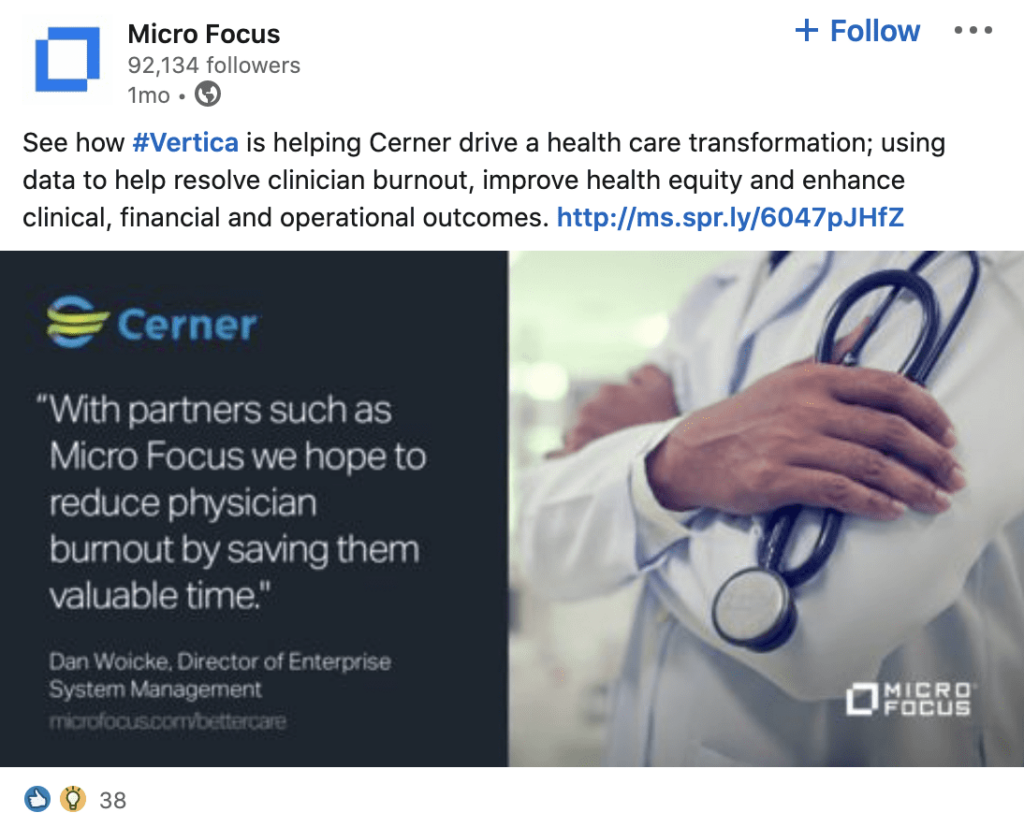
The Top Platforms and Tools to Use for B2B Social Media
You’ll want to tailor your B2B content marketing specifically to the social networks that your buyer personas and target audiences most use. Each platform has different specs, content types, and optimized posting frequency schedules.
Here are some of the top social channels to consider::
- LinkedIn – LinkedIn has over 760 million users and 40% of those use it on a daily basis. And even more importantly for B2B marketers, 46 million of those users are B2B decision makers. LinkedIn has become a go-to source for professionals to share and grow their personal brands so make sure this platform is a big part of your marketing strategy.
- Twitter 87% of B2B marketers use Twitter for content marketing according to the Content Marketing Institute. It’s a great platform for maximizing brand awareness and respond to customer questions. Twitter is also a great tool for social monitoring and listening, and brands will use the platform to track conversations and sentiment around their brands and competitors.
- Facebook – leveraging Facebook Business Pages is a relevant channel for most brands. 65% of B2B marketers use Facebook ads.
- YouTube – as video content became a more integral part of every marketer’s toolkit, so did YouTube. Videos will show up in Google search results when they are optimized and can be a key part of your SEO tactics.
- Instagram – Instagram is the platform for the most visual storytelling. High quality photos and videos work best here so be sure to invest in your creative design for these posts. Instagram Stories have also been used to poll followers for feedback, share behind the scenes footage of employee life, and showcase events.
- TikTok – TikTok is a newer platform but really took off in 2020 with massive growth rates. Tutorials, challenges, and educational content have become some of the most popular content on the platform so brands have a real opportunity to engage and connect with younger audiences that are eager to learn.
Now that you’ve checked out these inspiring B2B social media examples, and you’ve determined the right social platform mix for your business, you’re ready to create!
Here are some B2B social media tools that will help create and distribute the best content:
- Canva – an easy-to-use tool to design and create graphics for your company’s social posts. They offer templates for the different types of content on social media platforms that are easy to customize and edit.
- Giphy – GIFs are great to use when engaging in conversations on social and can add personality and humor to conversations with your brand. Giphy offers tools to find and create your own GIFs to share.
- EveryoneSocial – our platform makes it easy for employees to get access to the latest social content to share, keep tabs on what content has strong engagement with analytics, and share to their own social networks with just a few clicks.
- Buzzsumo – this tool shares data and insights around what content is most popular and resonating with audiences. B2B content marketers can use the data to drive content strategies and benchmark performance against competitors.
Interested in strengthening your brand’s B2B social media strategy and building an internal community of advocates with EveryoneSocial? Learn more about us here.













